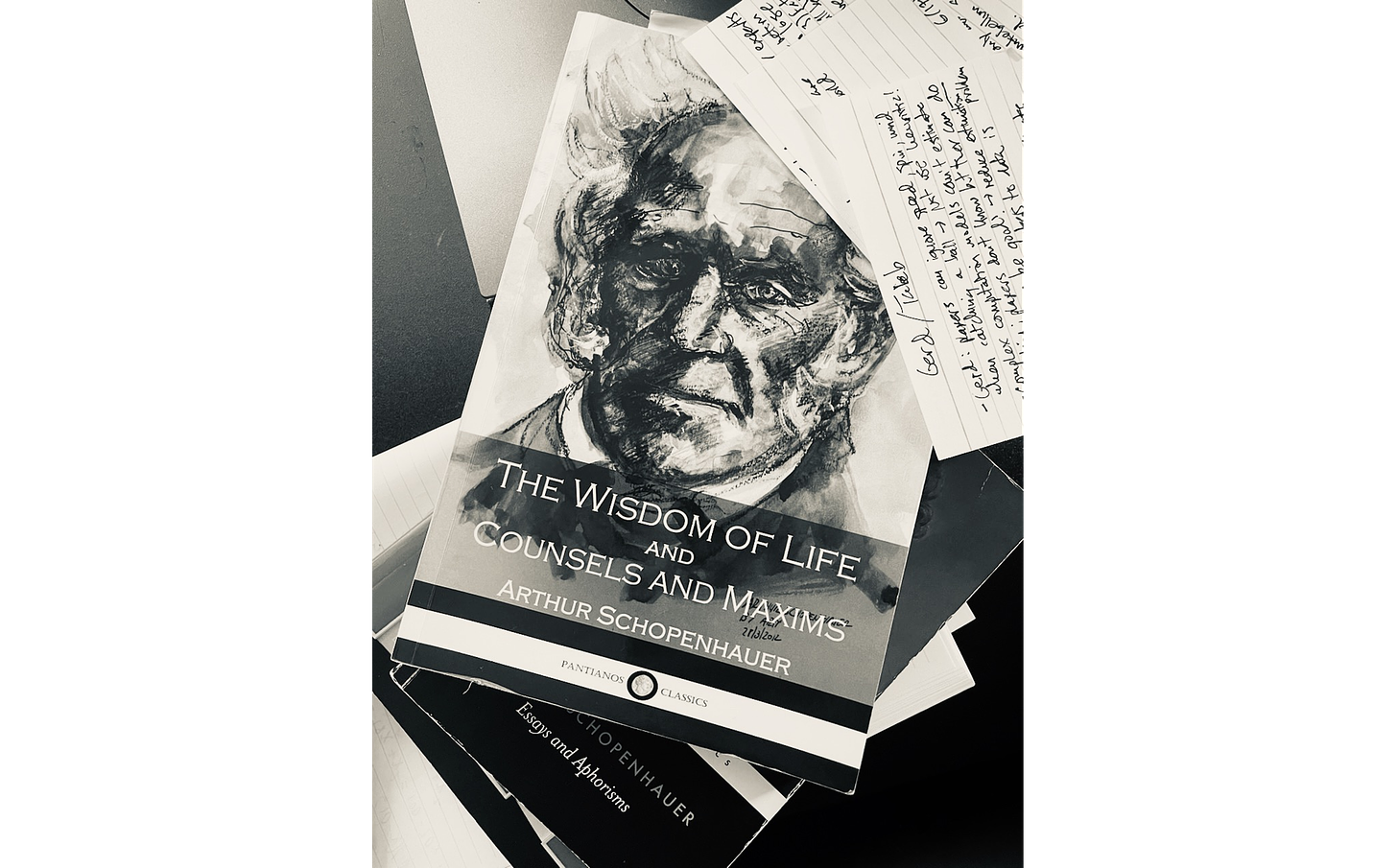Hi all,
Today’s note is a short compilation of some of my favorite ideas on life from Arthur Schopenhauer, the 19th century German philosopher.
I also would like to put some money down on the term “Schopenhauer Nuggets” never being uttered / written before in human history.
In other news, today is also the big day for the Big Game™, Super Bowl LVII. Will the players be treating this like a finite or infinite game?
Will they be playing to win… or for the sake of football itself?
Thank you,
Brendan
#1: Envy
“States of human happiness and good fortune can as a rule be compared with certain groups of trees: seen from a distance they look beautiful, but if you go up to and into them their beauty disappears and you can no longer discover it. That is why we often feel envy for other people.” (Essays and Aphorisms)
In Voltaire’s Candide, Martin and Candide have just arrived in Venice and are taking in the lively outdoor social scene. Candide spots a happy looking couple who is out to dinner and invites them to join their table, thinking they’ll make lively company. After some brief conversation, it’s clear the couple’s situation isn’t so peaceful. The man is a Theatine monk out on the sly, and the woman is a prostitute! And they’re both quite miserable with how their lives are unraveling.
Envy is fueled by how we see other people’s lives from a distance. Like Candide, we can easily forget, from this distant perspective, that everyone is fighting an invisible struggle (even if they appear happy). Understanding this asymmetry can help us bring more empathy instead of envy to our relationships.
#2: Reading
“[M]uch reading robs the mind of all elasticity, as the continual pressure of a weight does a spring, and that the surest way of never having any thoughts of your own is to pick up a book every time you have a free moment.” (Essays and Aphorisms)
If Schopenhauer were alive today he’d probably say a similar thing about our tendency to constantly check emails, scroll through Twitter, and “be productive”. I’m guilty of this too. We need to create space, quiet, and maybe even boredom for original ideas or solutions to emerge. As writer/researcher assistant Billy Oppenheimer writes,
“Robert Greene once told me that there's a dividing line between success and failure: the ability to sit with boredom. Great creative work, he said, is the product of a very boring and tedious process—hours and hours of thinking and daydreaming and researching and doing nothing.”
#3: Discerning Devils and Fools
“And you will always be the prey or the plaything of the devils and the fools in this world, if you expect to see them going about with horns or jangling their bells.” (The Wisdom of Life and Counsels and Maxims)
Out in the world, most of us wear a mask to show the best side of our character. Carl Jung called the other side—the side we repress—the Shadow.
The devils and fools of the world follow this same rule. They too like to put their best foot forward and disguise what’s dangerous or ridiculous about them.
The most dangerous devils are those who are most adept at hiding their aggression or intentions to harm. Likewise, the most dangerous fools are those who spout misinformed information yet hide behind credentials or a prestigious piece of paper.
I hate to reference Robert Greene again, but his book The Laws of Human Nature has a lot of interesting tools for assessing human character.
#4: Find Your Talent
“The man who is born with a talent which he is meant to use, finds his greatest happiness in using it.” (The Wisdom of Life and Counsels and Maxims)
Notice how Schopenhauer doesn’t suggest we follow our passions or dreams (his pragmatism is surprising to me!). His focus is on talent; what we’re naturally good at.
Scott Galloway makes a similar point on talent in The Four:
“Don’t follow your passion, follow your talent. Determine what you are good at (early), and commit to becoming great at it. […] And, ultimately, you will be able to shape your career and your specialty to focus on the aspects you enjoy the most. And if not—make good money and then go follow your passion.”
I’m likewise of the belief that we become passionate about what we’re good at. Competence is what drives earnings, status and a sense of happiness in one’s work. And you get a head start at competence with talent.
Further Reading:
Essays and Aphorisms, Arthur Schopenhauer
The Wisdom of Life and Counsels and Maxims, Arthur Schopenhauer
Candide, Voltaire
The Four, Scott Galloway
Thanks for reading! I love when these thoughts lead to conversations with readers. Did you find anything interesting or surprising? Reply to me and let me know.






